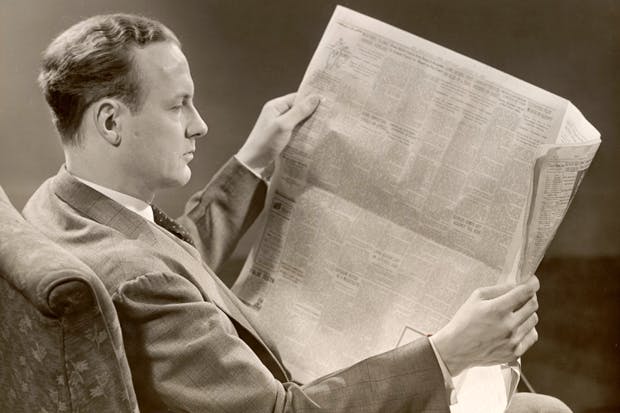Liverpool airport is a curiously unreal place in the half-light before dawn on a cold November morning. Out across the Mersey at high tide, raindrops turn the silver to lead, and at the easyJet departures gate people in tracksuit bottoms brush against the occasional tweed and Remembrance Day poppy. Intending stag-weekenders, and the set who have a little place in the Pyrenees, coincide but do not mingle. A young woman is trying to buy rosé wine, and an elderly gent is trying to find a copy of that morning’s Times.
The elderly gent is me, flying to Barcelona for the day for my sister’s 60th birthday lunch, to return that night to Manchester.
And yes, all the morning papers are available and I buy the one I write for; but it would make no difference if the paper had been the Telegraph or any other quality newspaper: my experience would have been the same. That experience is one I must have had thousands of times when younger: no more an ‘experience’ then than cleaning my teeth. This time, however, it felt strange and almost new.
I read a newspaper.
Of course I read newspapers all the time. I read them mostly online these days — it’s more convenient when you’re busy. And I’m always busy; always trying to do two things at once; always hurrying from one to another. For this kind of newspaper reading, online is brilliant. You can dive in, dive out. If you know what you’re looking for (and I usually do) you move with one click straight from a contents list to your desired report or column. There are news and politics summaries too; and you can flick between papers, and Google, and check a video link, and consult Wikipedia. The internet is a frighteningly efficient way of hunter-gathering. Our newspaper industry has decided to get itself out there online, and be part of that world. I do not regret this.
Indeed I’ve followed suit, though I don’t remember deciding to; I was resistant at first. I had taken a newspaper daily from the day I went up to Cambridge and subscribed to a special student offer, and every morning would look forward to the sound of the Times flopping onto my doormat, or onto the floor outside my hotel room; and drag the paper onto my bed; and begin the day indolently reading.
I can’t remember when this stopped. It must have been gradual. Slowly the convenience of looking online for what’s required must have impressed itself upon me. Slowly I switched from starting my day by seeing what there was, to snatching for what I wanted. I carried on receiving a daily print edition — I still do — but imperceptibly the physical, palpable paper must have slipped away from the focus of my morning. Perhaps I got busier. Certainly online was easier. Whatever the explanation, the result has been that it must now be ages since I read a newspaper properly in the old-fashioned way.
But on this November morning something in my head switched itself to standby. I’d been up at five. It would be a crowded flight in a cramped seat. And it would only be two hours. I’d worked hard and late the day before. Why not just buy a paper, buy a cup of tea, fold down my tray, and relax?
So as we roared off from the Liverpool runway with a grey light streaking the eastern sky, I spun myself a virtual cocoon within a cabin full of sleepy passengers, and with two empty hours ahead, settled into the Times for a session that was to all intents and purposes open-ended. There was nothing else to do. I felt at leisure.
An author called Mark Forsyth (he’s not unrelated to this journal’s James) has this year published a little pamphlet, ‘The Unknown Unknown’, about independent bookshops. In a way its subtitle says it all: ‘Bookshops and the Delight of Not Getting What You Wanted’. The burden of Mr Forsyth’s song is that undirected browsing, the wandering that allows itself to be distracted from its nominal destination, the vision that slips easily off-focus into what’s peripheral and may dwell there, is a lost pleasure to those who buy books with the fierce directedness that (for example) Amazon permits.
My grandad would have agreed with Forsyth. I have a beautiful Victorian clock and a Chinese vase he came home with 90 years ago, after Nana sent him out with money to buy bed-linen.
It struck me as I read my paper that Forsyth’s observation applies equally to the difference between relaxing with the printed Saturday edition of a quality newspaper, and the urgent directedness that had become my habit as an online reader.
Reading up there in the clouds I felt purpose slacken and idle curiosity grow.
In her ‘Feedback’ column, Rose Wild had published a moving poem by a reader’s great-uncle about the first world war (in which he was later killed). I had time to read all the letters to the editor, even one about rugby which was very funny though I’m not interested in rugby. I learned from a nature diary that lichen is not an organism but a partnership of algae and fungi. A colleague had written feelingly about the death of his mother. Indulging myself a little, I read every article in the paper’s extended coverage of the weekend’s crisis in Ed Miliband’s leadership, and reflected that sources seemed rather thin.
And then the pilot’s voice cut through this happy immersion in Things You Didn’t Buy The Newspaper To Read; and we were coming in to land at Barcelona.
Two hours had sped. By being reminded of what was once familiar, I had had a new experience. I had read the morning paper as we used to in the old days, days that will never return. And I had realised that I was missing something: something that slipped away while I wasn’t looking. Sadly, I folded up my newspaper.
Got something to add? Join the discussion and comment below.
Get 10 issues for just $10
Subscribe to The Spectator Australia today for the next 10 magazine issues, plus full online access, for just $10.















Comments
Don't miss out
Join the conversation with other Spectator Australia readers. Subscribe to leave a comment.
SUBSCRIBEAlready a subscriber? Log in